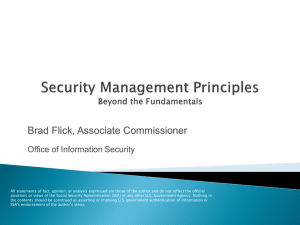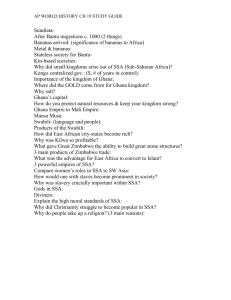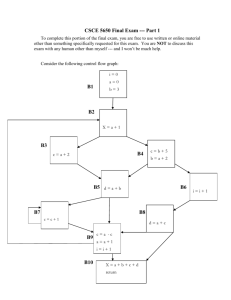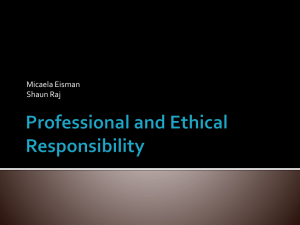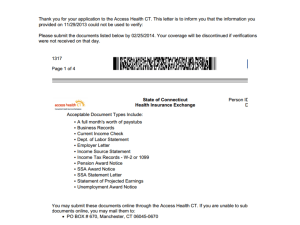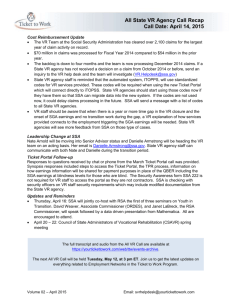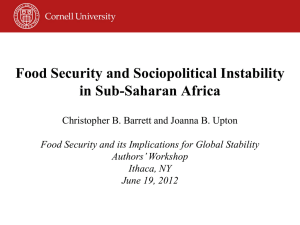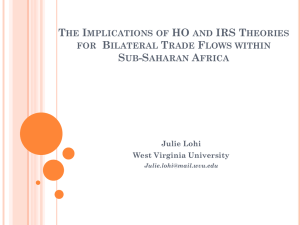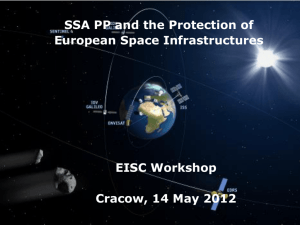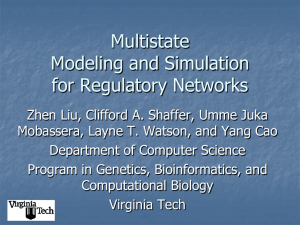doc - Climate Modeling Laboratory
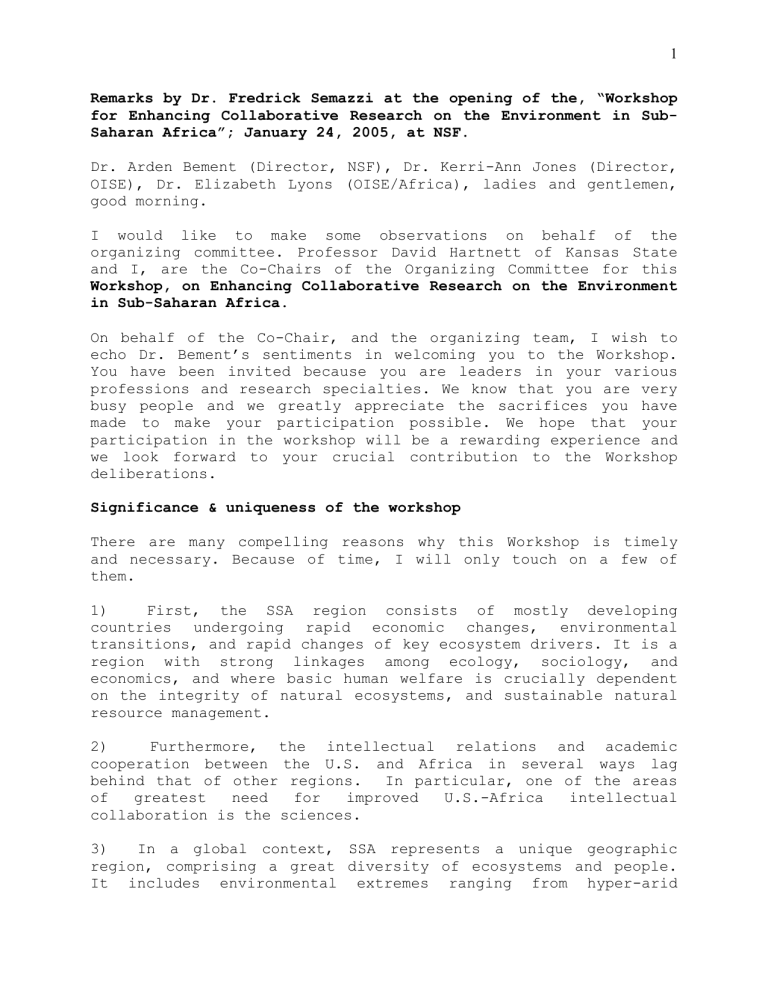
1
Remarks by Dr. Fredrick Semazzi at the opening of the, “Workshop for Enhancing Collaborative Research on the Environment in Sub-
Saharan Africa”; January 24, 2005, at NSF.
Dr. Arden Bement (Director, NSF), Dr. Kerri-Ann Jones (Director,
OISE), Dr. Elizabeth Lyons (OISE/Africa), ladies and gentlemen, good morning.
I would like to make some observations on behalf of the organizing committee. Professor David Hartnett of Kansas State and I, are the Co-Chairs of the Organizing Committee for this
Workshop, on Enhancing Collaborative Research on the Environment in Sub-Saharan Africa .
On behalf of the Co-Chair, and the organizing team, I wish to echo Dr. Bement’s sentiments in welcoming you to the Workshop.
You have been invited because you are leaders in your various professions and research specialties. We know that you are very busy people and we greatly appreciate the sacrifices you have made to make your participation possible. We hope that your participation in the workshop will be a rewarding experience and we look forward to your crucial contribution to the Workshop deliberations.
Significance & uniqueness of the workshop
There are many compelling reasons why this Workshop is timely and necessary. Because of time, I will only touch on a few of them.
1) First, the SSA region consists of mostly developing countries undergoing rapid economic changes, environmental transitions, and rapid changes of key ecosystem drivers. It is a region with strong linkages among ecology, sociology, and economics, and where basic human welfare is crucially dependent on the integrity of natural ecosystems, and sustainable natural resource management.
2) Furthermore, the intellectual relations and academic cooperation between the U.S. and Africa in several ways lag behind that of other regions. In particular, one of the areas of greatest need for improved U.S.-Africa intellectual collaboration is the sciences.
3) In a global context, SSA represents a unique geographic region, comprising a great diversity of ecosystems and people.
It includes environmental extremes ranging from hyper-arid
2 deserts to rainforests, and mountains and escarpments to coastal and marine systems.
4) An important area of optimism is that a significant knowledge base is already being built by researchers within the region, and in many cases the SSA scientists are at the leading edge and contributing much toward conceptual advances in various fields such as ecological modeling, large animal behavior and ecology, fire ecology and management, desert ecology, climate, and other important areas.
5) In addition, there are numerous research areas and regional environmental issues of mutual interest to both SSA & the US.
The combination of these factors and enhanced collaboration between U.S. and SSA scientists can yield major advances in our scientific understanding of the environment and our capacity to address key environmental issues.
Considering its regional focus and multidisciplinary scope, the
SSA Workshop is the first of its kind, involving PIs with awards from several NSF directorates and representing several disciplines (e.g. ecology, atmospheric sciences, anthropology, sociology, and engineering).
We hope the collective wisdom of the participants in this
Workshop will provide the kind of feedback and recommendations to the NSF scientific staff and researchers, that would otherwise not be possible through traditional alternative mechanisms.
The organizers also believe that the meeting will promote and facilitate the multi-disciplinary collaboration, integration and synthesis of results, and the coordination necessary to effectively address important environmental issues in the SSA region.
We see this meeting as a crucial first step in building a community of scholars and a culture of strong intellectual collaboration within the SSA region.
In addition, we believe this forum will help to build a strong network, enabling US PIs to establish linkages with both African and other US scientists.
We hope the deliberations during the Workshop will help to establish direct links between NSF-funded scientists and other
3 funding agencies and institutions that have existing programs and/or interests in the SSA region.
Agenda
Main: The agenda which has already been distributed focuses on several key issues of highest priority to address the theme of the workshop. Plenty of flexibility has been built into the agenda to ensure maximum participation and effectiveness of the discussions. More detailed introduction of the various sessions will be made as we move along in the program.
IT: All I want to say about the agenda at this time is that after the main workshop (Monday through Wednesday), there will be a follow-on Workshop on Thursday and Friday devoted to IT concerns that is; information management, computer resources and technologies issues.
A subset of participants have made plans to stay for the follow on IT Workshop. If you have not done so and you would like to attend please contact Dr. Bill Chang or Dr. Don Riley who are the Co-Organizers of the two-day IT Workshop.
The cross-pollination between the main workshop and the IT workshop is expected to occur through the participants who will be attending both workshops, and also the report-out session on
Wednesday.
ELTOSA : Also, I would like to announce that there will be a workshop of the Environmental Long-Term Observatories Network of
Southern Africa (ELTOSA) project scientists, which will meet on
Thursday. ELTOSA has many common interests with the SSA Workshop including IT networking capacities. There will be a brief plenary session for the ELTOSA & IT workshop participants on
Thursday (the actual time will be announced later). Dr. Joh
Henschel is the organizer of the ELTOSA meeting.
Expected results/outcomes
I would like to end these remarks by challenging the Workshop to devise specific and pragmatic strategies for improved communication and enhanced cooperation among members of the US and African research community working in SSA,
As another important key metric for measuring success of this
Workshop, we recommend that the discussions lead to improved knowledge for scientists and agencies, regarding, (1) ongoing
4 research in SSA, 2) African research priorities pertaining to the environment, 3) specific potential opportunities for interdisciplinary collaborative projects, and, 4) potential funding mechanisms.
Principal products
The target principal product of the Workshop is a detailed written meeting report to stakeholders, with specific recommendations to NSF.
the final report will be complemented by Website reporting,
and of course, it is anticipated that during the workshop additional forms of important deliverables are likely to emerge from the discussions.
Thank you very much!!
